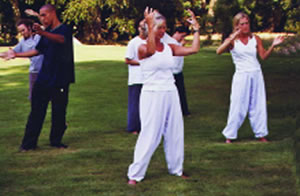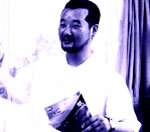Positive Health Online
Your Country

Wholistic Integrated Approach to Health
by Vivienne Silver-Leigh(more info)
listed in energy medicine, originally published in issue 95 - January 2004
Six months ago, a friend tipped me off that something new and powerful had reached the local high street. I went down to investigate and found a smart looking shop with an illuminated sign offering Meditation, Brain respiration, Stretching and Breathwork. I was intrigued by the one I had never heard of: brain respiration.
Charming Koreans inside offered me healing and massage there and then, which I enjoyed so much that I decided to embark on their programme, hoping to deal with my fatigue and gloom – the result of a recent disheartening medical diagnosis.
The courses seemed to have a holistic approach, consisting of exercises, meditation, healing, with Chi Gung and Yoga breathing. Certain physical exercises stimulate the Brain's functions, awakening its sensitivity, while others stretch the Meridian system, increasing the ki energy flow. The effects are subtle. I am definitely calmer and more detached from the pressures that occur in my life, and cope with them more efficiently.

After attending daily classes I graduated to a weekend workshop called Initial Awakening, and acquired a baggy white martial arts uniform. These weekends take you to a deeper understanding of the spiritual aspects of this work, as well as increasing physical strength and mind control. Each student is then given a personalized programme.
Many students experience Myong-Hyun, side-effects from releasing or detoxing. These can be extremely unpleasant, but are regarded as evidence of changes in the body. In the beginning I had painful arms, hips and feet but was taught new ways to deal with these. I now sit in a hot bath up to my navel if this recurs, or I do my 'toe-tapping' exercise three hundred times. We are encouraged to ring up the centre for exercises to help if the Myong-Hyun persists.
The teachers radiate an infectious belief in this system of positive healing of the body. I am a long way off the enlightenment that awaits me, if I continue to practise daily. But so far the results are definitely encouraging me to keep to my original commitment to try this programme for a year. Other students are enthusiastic about the benefits they are receiving.

Master Kim, European Director of
Brain Respiration Centres
Jenny Gilroy, a single mother with two teenage boys, works full-time as a massage therapist and has attended Dahn Hak classes three or four times a week for three and a half months. She noticed a difference after the first day she attended, and knew then that she wanted to stay. She practises at home, to help strengthen her to cope with all the demands on her. "I have made amazing progress – I have become calmer than I was before, not so disturbed by the children shouting, by people outside in the street, by all the disturbances and erratic behaviour and disagreements going on around. I can spend time now with people whom I would otherwise feel uncomfortable with. It has brought my focus more inside myself. This is part of the training, this watching yourself. It is now helping to regulate my behaviour and my responses, which perhaps before would be off the handle sometimes, or spur of the moment, wrong judgment – these sort of things are starting to change."
Shamsul Islam, from India, is married with two children and has lived in London for over 32 years. He has also been attending three or four classes weekly since he started three weeks ago. He thinks the Dahn Hak centre is fantastic. "I can't be grateful enough… The benefits I have received from the Centre are way, way out of proportion to the effort that I feel I have to give… I should be feeling very vindictive about a person who has hurt me and my family, but coming to the Dahn centre I am tending to forget about this situation. I cannot put a value on this." He smiles broadly.
All of us smile a lot, because we are urged to do so throughout the classes. It has been explained that smiling has an effect on the brain, helping it to become more peaceful. So we smile when an exercise is painful, and we give big smiles to everyone in the class, bowing and saying "Ban Gap Sum Nida", which is hello in Korean. I have overcome the British reserve that says this is ridiculous, what am I smiling for, and now I just do it purely for medicinal reasons. Everyone else seems to have come to the same conclusion, so there are hugs and smiles before and after each class. That way we all become friendly, and a society of dedicated brain improvers is evolving in Putney.
Class begins with a warm-up period, energetically slapping different parts of the body while counting aloud rhythmically, pounding our navels, tapping up and down our arms and legs, then finally loosening heads and shoulders. Half an hour of this, much laughing at our efforts, and we are all smiling at our instructor, our endorphins jumping into action.
This week is kidney week, and hands on lower backs, tapping away, we imagine our kidneys warming up. I participate energetically, hoping mine will stay healthy even if other bits of me are self-destructing.
We sit down and locate kidney acupressure points on the inside of each ankle, pressing fingers determinedly into them. Lying down next, blessed relief, relaxing to gentle music, focusing on breathing strongly into the abdomen. The teacher circulates, checks breathing patterns and makes sure the Dan John, the second Chakra located in the abdomen, is moving up and down.
The lights now dim, and we begin visualization of light entering the body, through the top of the head, coming down into the abdomen. Next, we move on to some holding postures, which demand focus and strength and which I do not find easy.
Then we sit up slowly, and begin to practise brain respiration, the healing part of the class. Breathing deeply, focusing on my palms, I bring them towards each other in front of my upper chest, visualizing a magnetic force pulling them towards each other, then apart. I slowly raise my hands around my head. We are asked to feel the energy of the brain in our hands. At first this seems impossible, but with practice, a sensation develops, an awareness of the brain itself.
The final part of the class is the meditational tea ceremony, where students sit in a circle to share thoughts or reactions to the class. Then, in silence, we take a cup of fragrant tea, hold it against the stomach, feeling the warmth, then drink slowly and consciously. It is a scene of peace and calm, far removed from outside pressures.
The originator of this training is Dr Ilchi Lee, a Korean philosopher and peace activist who modernized an ancient mind body training from ancient Asia, and incorporated it into a new methodology. He started this in 1985, teaching people how to bring the body and mind to a state of peace through a health regime called Dahnhak.
Lee says, "Peace is not an abstract concept that has to forever remain a stranger to our everyday and individual lives. Our life itself is peace. The single most fundamental function of life, the breath, is peace incarnated. Peace is the natural and uninterrupted cycle of life." Now there are over 600 centres worldwide, and over 5 million participants. Intensive Training regularly takes place in Sedona, Arizona, USA.
He realized that the best way to spread peace on the Earth, is to first help people to experience peace themselves. This simple idea turned gradually into a worldwide peace movement which has spread out beyond Korea, to Japan, Brazil, the US, Canada and Europe. Now there is a brand new International Graduate University for Peace, in Korea, where Peaceology will be part of the training courses, including a doctorate course. It will be a worldwide centre for peace. Dr Ilchi Lee believes you can develop a Power Brain that is creative, peaceful and productive. "Change your brain, Change your Life, and Change
the World."
One of the teachers is Lotus Garcia, who has trained in Brain Respiration for over four years. Seven years ago, while studying in Ireland, she became friendly with an American girl, who returned to Boston. They kept in touch and Lotus realized her friend was changing considerably from her new studies of Brain Respiration, both physically and emotionally. Lotus decided to follow her to Boston, then took the intensive training in Sedona before she returned to Spain. Lotus now works at the Putney Centre and says her life has changed more than she thought possible. She finds it so rewarding and fulfilling to see the way the Centre members change and heal through the training. She sees them recover physical health, and inner peace replaces emotional struggles. "It is one of the most beautiful things ever. The most important thing is that Brain Respiration affects the whole person, including the information in the brain, which is the key. If you can heal the brain, then we can heal the body, mind and emotions. Everything originates in the brain."
Dr Paul Sumners, Director of the Putney Centre, arrived by a different route. "I got into Brain Respiration because I was fascinated by the untapped potential of the brain through my previous research work as a Neurophysiologist at University. I had investigated biological mechanisms of how we learn to breathe, and I always knew there was so much more that we were not using. Five years ago I came across Brain Respiration through reading Conversations with God by Neale Donald Walsch. There were no training Centres in the UK at that time, so I ordered books and videos and practised in my bedroom for a year and a half.
Then three Korean senior masters came over to the UK and I had one-on-one training with them. The training was deep and often painful but very rewarding." He used to play volleyball at a high level which left him with badly damaged knees, ankles and lower spine, and they are now healed, through Brain Respiration training.
Paul started instructor training in Surbiton, then taught part-time there while still doing Neurophysiology research. Next, he assisted the Korean teachers in Putney, taking over as Director in February 2003. "Currently the work I am doing in Brain respiration is the most important thing I have ever done in my life," he says.
The first Brain Respiration Centre, or DahnHak, opened in Surbiton in 2001 and the second in Putney, in December 2002. They attracted local interest quickly. You can pay membership fees to attend an unlimited number of daily morning or evening classes, or a reduced fee that will entitle you to two a week. Weekend Workshops deepen the effects of the classes.
Resource
Lee I. Brain Respiration. Healing Soc. Inc. 2002.
Further Information
The Dahnhak Energy Centre, 199b Upper Richmond Road Putney, Tel: 020 8780 2555 or 59 Fleece Road, London Ditton Surbiton, Tel: 020 8339 3776. You can try out a free Saturday class.
Comments:
-
No Article Comments available